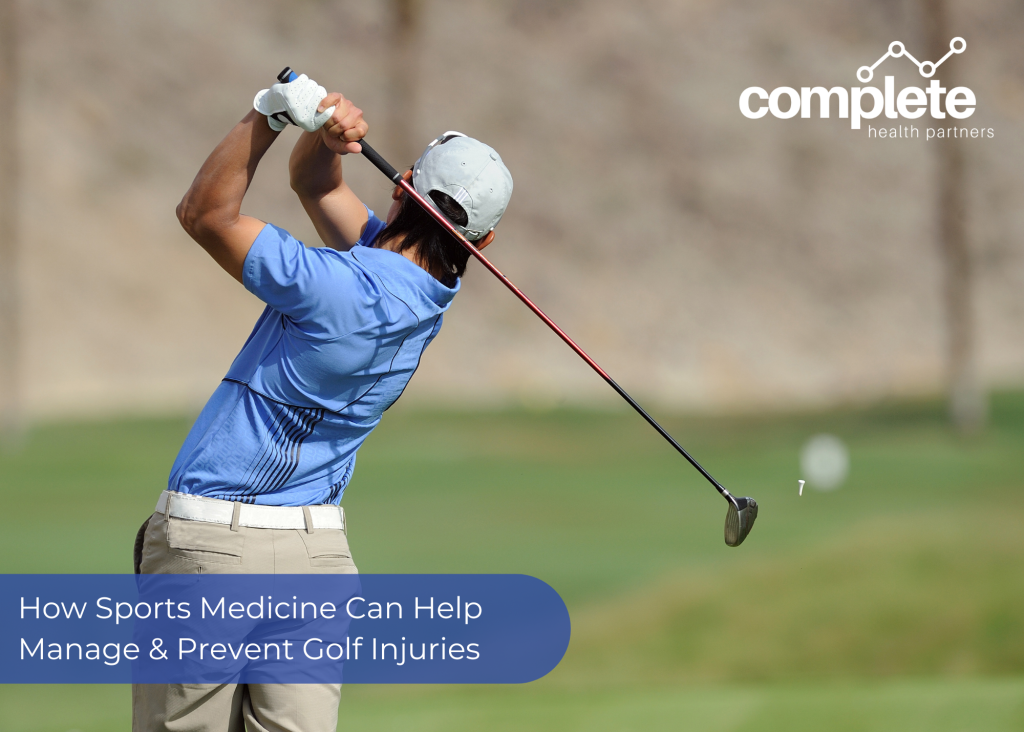Golf is mostly known as an low-impact sport, however, it does require a good amount of strength and flexibility. Avid golfers may experience different injuries due to the repetitive motions the sport requires. These injuries can lead to a hinder in performance but, sports medicine offers tailored solutions to prevent & manage these injuries.
Common Golf Injuries
Golf injuries usually are from overuse, poor technique, or lack of conditioning. The most common include:
- Golfer’s Elbow (Medial Epicondylitis): Caused by repetitive strain on the forearm muscles, leading to pain and inflammation in the inner elbow.
- Lower Back Pain: Often due to the twisting motion during a golf swing or poor posture.
- Shoulder Injuries: Rotator cuff strains or tears are common among golfers due to the overhead and rotational demands of the swing.
- Wrist Tendonitis: Repeated gripping and swinging can inflame the tendons in the wrist.
- Knee Injuries: The rotational forces involved in the swing can stress the knee joints, especially if there are pre-existing conditions like arthritis.
How Sports Medicine Helps
Sports medicine focuses on preventing and treating injuries while optimizing performance. Here’s how it can benefit golfers:
Injury Prevention
Sports medicine professionals can identify pre-existing injuries as well as weaknesses or imbalances in your body that make you more susceptible to injury. They create personalized treatments plans to improve flexibility, strength, and stability, ensuring your body can handle the physical demands of golf.
- Stretching and Mobility Work: Targeted stretches improve range of motion in the hips, shoulders, and spine, which are crucial for a smooth swing.
- Strength Training: Exercises for core stability and lower body strength reduce strain on the back and knees.
Diagnosis and Treatment
For golfers already experiencing pain or discomfort, sports medicine specialists offer diagnoses and treatments tailored to the injury.
- Injections: Corticosteroid or regenerative medicine injections (like PRP) may be used for persistent inflammation or injury.
- Education: Sports Medicine providers may educate their patients on techniques like massage and joint mobilization or other at-home remedies.
- Physical Therapy: A referral to physical therapy may be required for tailored exercises to reduce pain, restore function, and improve mechanics.
Tips to Stay Injury-Free on the Course
- Warm Up Properly: Spend at least 10 minutes stretching and doing light activity to prepare your muscles for play.
- Perfect Your Technique: Work with a golf coach to refine your swing and avoid unnecessary strain.
- Invest in the Right Equipment: Clubs suited to your body type and skill level can prevent awkward movements.
- Listen to Your Body: Don’t ignore pain or discomfort. Early intervention can prevent minor issues from becoming serious injuries.
Complete Health Partners Sports Medicine Program
If you’re experiencing persistent pain, limited mobility, or recurring injuries, it’s time to consult a sports medicine professional. They can provide the care you need to get back on the course and enjoy the game you love. At Complete Health Partners, you don’t have to wait hours in the waiting room to get quality care. With online appointment booking and our double board certified sports medicine physician, David Neblett, MD, you can get the care you need, when you need it. Whether you need sports medicine in Hendersonville or Nashville, both of our convenient locations are open 7 days a week with onsite x-ray.
6749 Charlotte Pike, Nashville, TN 37209
629.203.7858
9am – 7pm, 7 days a week
166 E Main Street, Hendersonville, TN 37075
615.991.2855
9am – 7pm, 7 Days a week

